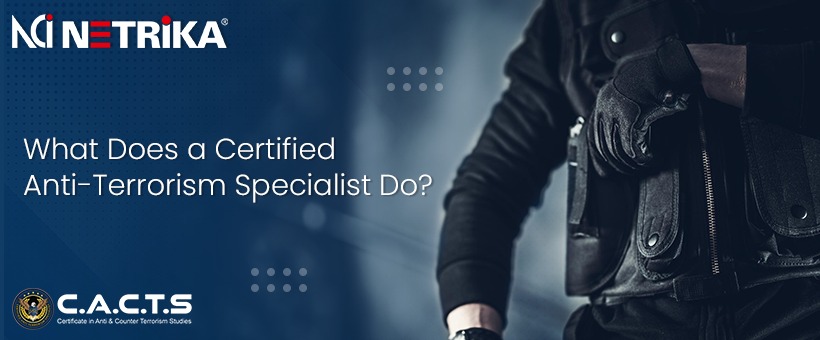News & Events
What Does a Certified Anti-Terrorism Specialist Do?
- January 25, 2024
- Posted by: marketing@netrika.com
- Category: Blogs

Anti terrorism is the act of incorporating cutting-edge techniques, military practices, and intelligence strategies and enforcing laws to combat terrorist activities. Specialists who undergo a certified program in counter-terrorism are trained with the best practices, skills, and knowledge to proactively identify such acts as well as counter them before they strike. Moreover, they are also equipped to handle the situation in the aftermath of a terrorist act.
Counter terrorism certification enables specialists to understand the source of terrorist activities, and leverage the best method and tactics to take down terrorist groups in their attempt to sabotage acts. Certified anti terrorism specialists process, validate the threat information, and analyze its source to plan how, when, and where the terrorist could occur.
Some of the most crucial responsibilities of a certified anti terrorism specialist include-
Threat Assessment and Analysis: CACTS courses equip a professional with skills to conduct extensive threat assessments to analyze potential risks and vulnerabilities in different scenarios. This could incorporate the social, political, cyber, or social aspects of the terrorist threat landscape.
Intelligence Data Gathering: Certified anti terrorism specialists gather, assess and interpret intelligence data collected from agencies or government bodies that could potentially pose a terrorist threat. To align it with mitigating risks, they further evaluate the existing security measures, recommend modifications, and oversee the changes implemented to strengthen the overall security.
Security Planning: Anti Terrorism training courses help professionals become adept at designing, developing, and implementing security plans ahead of a sensitive event. This could include addressing the past security landscape in the region, making changes to existing security measures, or adding to the existing security posture depending on the specific environment.
Emergency Response and Crisis Management: How to respond in an emergency and manage a crisis is one of the most crucial aspects of a certified anti terrorism specialist. This involves devising plans, conducting emergency drills, and collaborating with intelligence as well as emergency response agencies for swift and effective action.
Collaboration with Law Enforcement Agencies: Specialists with anti terrorism certification are equipped to foster a positive and strong relationship with law enforcement agencies as well as government bodies on the local, national, and international platforms. This helps them leverage intelligence data, and critical information, coordinate joint operations harmoniously, and counter terrorists cohesively.
Risk Mitigation and Resilience Building: Certified anti terrorism specialists identify and combat potential threats while working towards a more resilient community that can both withstand and recover swiftly from the impacts of terrorist acts.
Cyber Security Integration: Cyber security is one of the most vulnerable areas that comes under the lens of terrorists and has been one of the most misused for spreading their agenda. To say the least, terrorism and cyber security are intertwined, which makes it essential for counter terrorism specialists to assess, fortify, and recognize the extent of cybersecurity’s role in terrorism as well as countering these acts.
Training and Education: As part of the anti terrorism certification, specialists are also involved in providing training to people who are responsible for maintaining the security of a community, an organization, or a nation. This includes conducting workshops and drills by including best practices that ensure anti terrorism preparedness.
The role of a specialist with anti terrorism certification is multifaceted which involves them being strategic thinkers with operational efficiency and adept at evolving themselves as the threat landscape evolves. Thus, anti terrorism training courses and certifications such as CACTS are ideal for professionals who want to build a career in this vertical.

